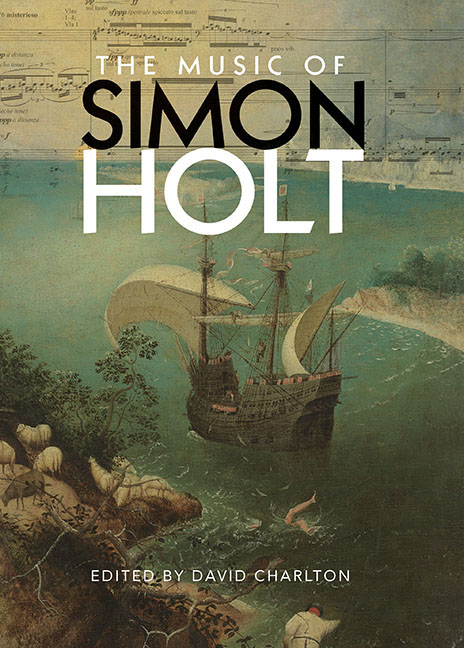Book contents
- Frontmatter
- Contents
- Figures and Tables
- Contributors
- Preface and Acknowledgements
- Abbreviations, with a note on recordings and scores
- Introduction Memories of Magical Moonlight: Simon Holt's years as a composition student
- 1 Duende y Duelos: The Andalusian spirit in the Lorca settings
- 2 An Interplay of Passion and Spirit: The Nightingale's to Blame
- 3 Images in Sound: Movement, harmony and colour in the early music
- 4 Myth and Narrative in 3 for Icarus
- 5 Sound, Sense and Syntax: The Emily Dickinson settings
- 6 Piano Music
- 7 Redefining the Cello's Voice: Musical agency in feet of clay
- 8 Performance and Reflections: Holt's music for oboe and cor anglais
- 9 Shaking the Bars: The Yellow Wallpaper
- 10 Listening to the River's Roar: Stance, texture and space in the concertos
- 11 Orchestral Works in Performance
- 12 Oblique Themes and Still Centres: A conversation between
- 13 Sketching and Idea-Gathering
- 14 Art, Conceptualism and Politics in Holt's music
- Appendix A Overview and Catalogue of Pieces
- Appendix B Texts by Simon Holt for Raju Raghuvanshi is a ghost and The Legend of Melusine
- Bibliography
- Index of pieces by Simon Holt
- General index
Introduction Memories of Magical Moonlight: Simon Holt's years as a composition student
Published online by Cambridge University Press: 01 September 2018
- Frontmatter
- Contents
- Figures and Tables
- Contributors
- Preface and Acknowledgements
- Abbreviations, with a note on recordings and scores
- Introduction Memories of Magical Moonlight: Simon Holt's years as a composition student
- 1 Duende y Duelos: The Andalusian spirit in the Lorca settings
- 2 An Interplay of Passion and Spirit: The Nightingale's to Blame
- 3 Images in Sound: Movement, harmony and colour in the early music
- 4 Myth and Narrative in 3 for Icarus
- 5 Sound, Sense and Syntax: The Emily Dickinson settings
- 6 Piano Music
- 7 Redefining the Cello's Voice: Musical agency in feet of clay
- 8 Performance and Reflections: Holt's music for oboe and cor anglais
- 9 Shaking the Bars: The Yellow Wallpaper
- 10 Listening to the River's Roar: Stance, texture and space in the concertos
- 11 Orchestral Works in Performance
- 12 Oblique Themes and Still Centres: A conversation between
- 13 Sketching and Idea-Gathering
- 14 Art, Conceptualism and Politics in Holt's music
- Appendix A Overview and Catalogue of Pieces
- Appendix B Texts by Simon Holt for Raju Raghuvanshi is a ghost and The Legend of Melusine
- Bibliography
- Index of pieces by Simon Holt
- General index
Summary
HALF A LIFETIME AGO, in the late spring of 1973, Peter Maxwell Davies and I drove up to Manchester to help John Manduell, as Principal, set up his School of Composition at the newly created Northern (later Royal Northern) College of Music, the only English conservatoire to offer ‘firststudy’ Composition at the time. Exactly four years later I received a note from Max, as he was always known, recommending a bright new talent from Bolton, at the time studying art, named Simon Holt. Evidently he had approached the RNCM a month or so before, but his application had been disallowed due to lack of a music A-level or the equivalent. In any case, we had just accepted four very promising new composition students, leaving no places for any more that year. Nevertheless, Simon dropped by for what we called an ‘advice audition’, and I was struck by the freshness, variety and absolutely non-academic nature of the music he brought with him. For administrative reasons he was advised to wait a year before making a formal application, so it was in in the spring of 1978, on the strength of a powerful portfolio of works and a clear sense of commitment, that he was accepted on a course specially set up for this obviously gifted student who lacked the academic prerequisites. These highly focussed four years would enable him to concentrate entirely on the subject in hand. And concentrate he did.
Unfortunately, because I'd already agreed to go to Sydney for a year to help the terminally ill Don Banks re-fashion the Composition department at the New South Wales Conservatorium, I was unable to work with Simon until September 1979. In the meantime, however, under the guidance of visiting Czech composer Petr Eben, he had already written one hauntingly beautiful song for mezzosoprano and bass flute, Lunas Zauberschein (Goethe), showing the sense of gently exploratory line, poise and timing that became notable features of his work for decades thereafter. What was interesting, though, was that certain features characterising the pieces he had submitted for his audition, particularly gesture and texture, were now far less to the fore. Evidently Petr Eben found his approach to composition too unconventional and tried a little gentle re-steering.
- Type
- Chapter
- Information
- The Music of Simon Holt , pp. 1 - 4Publisher: Boydell & BrewerPrint publication year: 2017

